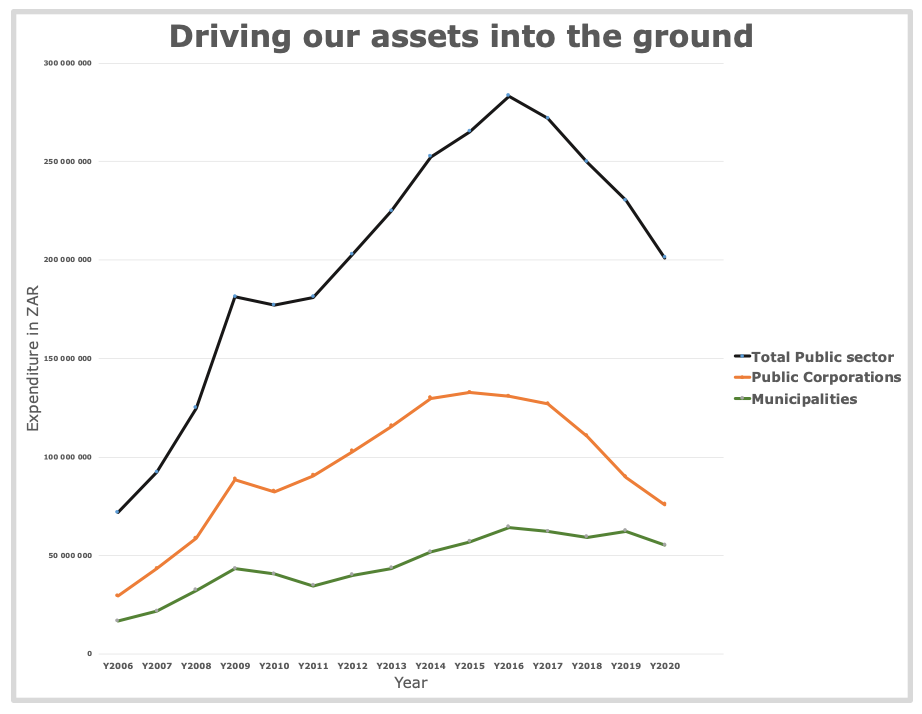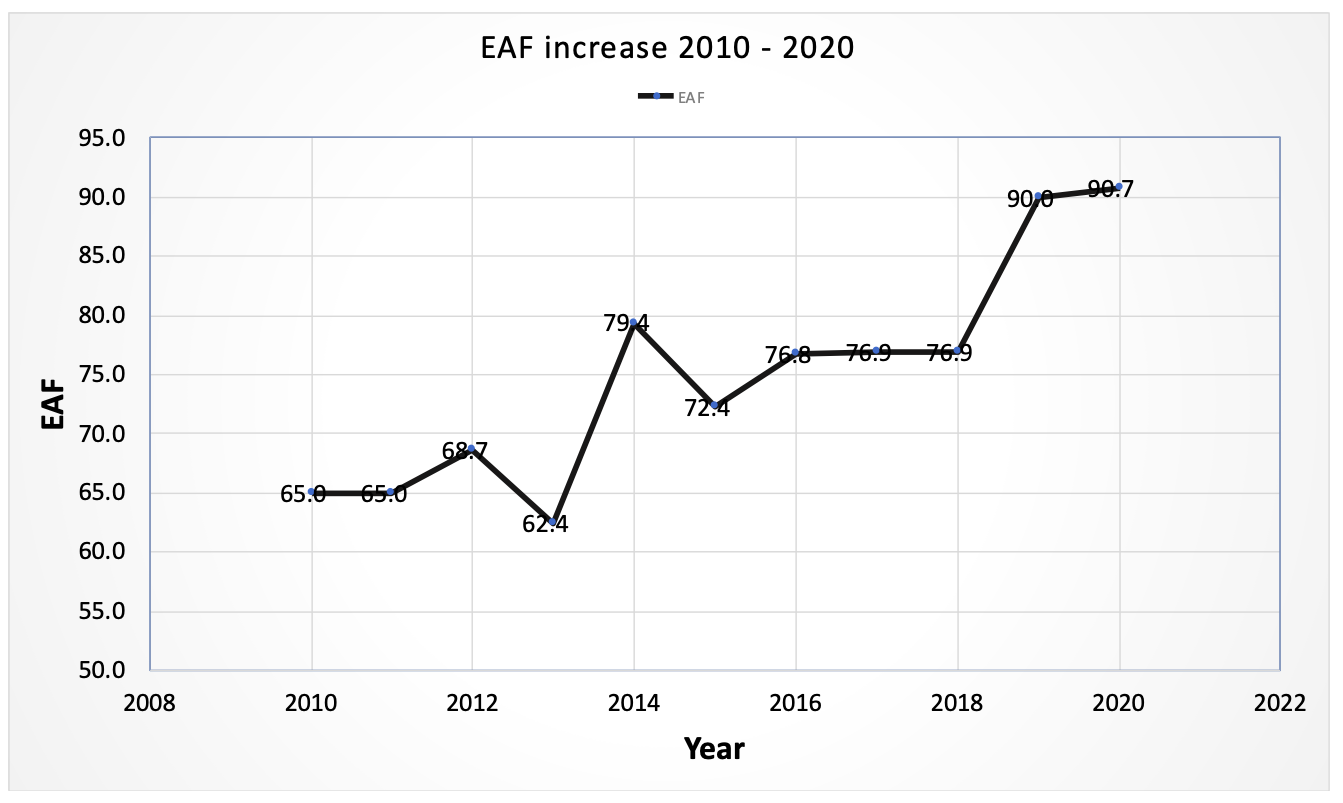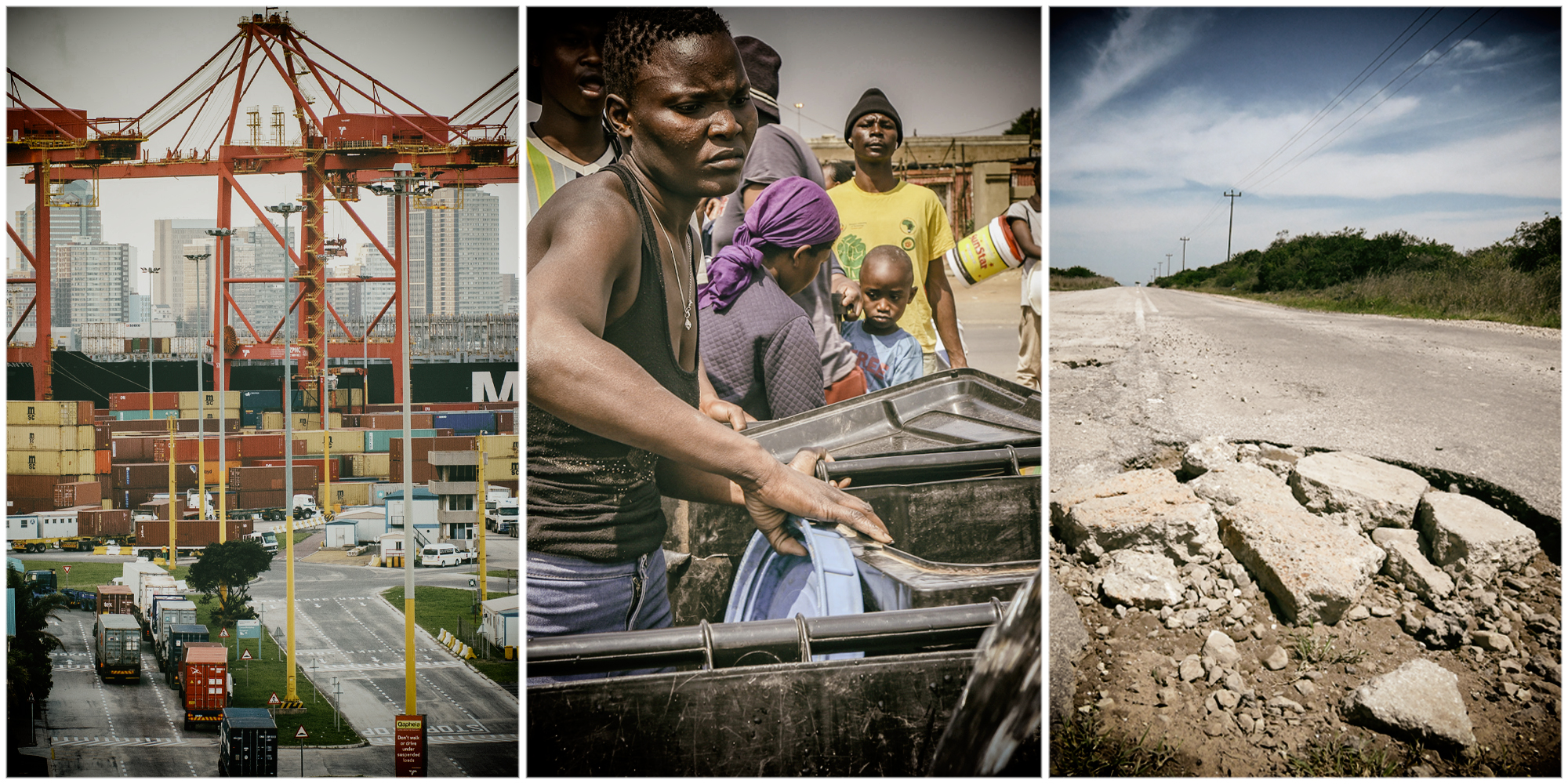The most common lived experience in South Africa which affects all races, classes, regions and sectors is the growing frustration with the inability of the state to provide essential services.
All South Africans experience the sinking feeling of coming home to a dark house with a cold or unprepared meal awaiting as we experience yet another episode of rolling blackouts.
Compounding that frustration, we all travel on increasingly dangerous roads due to potholes, experience disruptions to water supplies, and even water quality. The list goes on.
A compendium of recent issues we face includes:
- The number of potholes in South Africa increased from 15 million to 25 million in five years;
- Johannesburg, the economic powerhouse of the country, is experiencing a water crisis: some suburbs went for up to three weeks without water supply and the sound of slowly filling toilet cisterns has now become a source of joy and celebration. This despite the Vaal Dam being 90% full and Sterkfontein Dam that feeds Vaal Dam being at full capacity;
- Eskom’s proven unreliability continues with power interruptions due to unplanned maintenance at ageing coal-fired stations, less-than capacity generation at the vastly overpriced Medupi and Kusile power stations, as well as insufficient diesel supplies to run the emergency generators;
- Coal exports through the privately developed and owned Richard’s Bay Coal Terminal (RBCT) was, in 2021, a mere 58.7 million tonnes, the lowest since 1996 and far below the design capacity of 91 million tonnes. The constraints were due to cable theft and the poorly maintained rail tracks of Transnet that resulted in mined coal not reaching the export terminal despite a massive international demand;
- Despite South African ports’ efficiency being far below the global average and constantly declining, the National Port Authority’s latest report indicates it was unable to implement essential capital expenditure projects, spending less than 50% of the R39.8-billion destined for port improvements;
- Several of Durban’s previously famous Blue Flag beaches have been turned into salty, sewage-soiled stretches and untreated sewage still flows into the Vaal Dam at Deneysville;
- Local authorities don’t maintain their water distribution networks and have lost water to the value of R9.82-billion in a single financial year; and
- The collapse of Prasa’s passenger rail services around the country.
The extent of the national collapse of services that depend on infrastructure has been long in the making. There were numerous technical reports and warnings by professional bodies and experts that under-investment in infrastructure and insufficient maintenance would result in too little electricity-generating capacity, heavily polluted rivers and major constraints in logistics.
As early as 2006, the SA Institute for Civil Engineering (Saice) issued their Infrastructure Report Card (IRC) warning that “while South Africa’s built environment infrastructure is very good, even world-class in places, the relatively poor overall grade reflects extensive maintenance and refurbishment backlogs, caused primarily by funding and skills shortages.”
The subsequent Saice IRCs of 2011 and 2017 conveyed the same message, but the tone got shriller: “the below average grade reflects the continuing low maintenance levels and even neglect in many areas. A lack of commitment to long-term planning, adequate dedicated funding, proper management systems, data collection and skill deployment are major contributing factors…”.
Infrastructure asset management is the recognised engineering discipline which encompasses the global knowledge base around which organisations care for assets. It is a well-trodden path, which recently resulted in the development of an International Standard for Asset Management (ISO 55000). This standard provides the structure and methodology around which organisations can organise and deploy to care for assets to meet organisational objectives. South Africa has considerable expertise in this area and made major contributions to the development of the standard.
As an advocate and believer in the huge benefits that adopting a professional asset management approach would provide to government and state-owned enterprises, I have campaigned over the last 10 years to take the message into this sector.
I have nearly been successful when Eskom, in 2012, commissioned me to implement an ISO 55000 asset management system at Kusile and Medupi, only to have this cancelled. I had similar experiences at Prasa, Sanral, Portnet and municipalities. I have spoken to government senior managers and to employed professionals (who listen with frustration, knowing that they could do better).
Visit Daily Maverick's home page for more news, analysis and investigations
The phenomenon of cadre employment has created an almost impregnable barrier to keeping the available asset management skills out of the public sector. There are many reasons for this, ranging from slow adoption to outright/overt corruption (I’ve experienced that as well) and a generally prevalent ideological suspicion of asset management or technical expertise as colonial phenomena or a proxy for neo-liberalism, and that the state knows best.
The irony, however, is that the best-selling ISO standard in China is the ISO 55000 standard. I was fortunate enough to be invited by the prescient Chinese government to participate in its launch in Beijing.
The failure to safeguard our assets is exacerbated by deliberate underinvestment in infrastructure management by the state and SOEs. See Figure 1, which is based on data from StatsSA — which I refer to as Driving our assets into the ground).
This graph shows how since 2015 we have consistently underinvested in the asset infrastructure of the country. The more likely explanation for the peak in 2015 is amplification due to the peak of State Capture.

A typical benchmark that best-practice asset management would indicate is that organisations should invest around 6-7% of the capital replacement value in maintenance and asset management; at around 2% we are making the explicit decision to destroy our assets.
Can we turn this around?
In the totality of human knowledge, there is only one technical discipline that can address the technical and financial aspects of managing the failure of the asset base in South Africa. There is no alternative methodology or ideology. Asset management is a body of expertise compiled by the most knowledgeable and experienced individuals and institutions in the field. It has no ideological basis.
For us as a nation to begin to address our various infrastructure crises, we require a rational starting point and asset management supported by the ISO 55000 standard is this. How one implements this and what the priorities may be is a discussion worth having, but we all need a common knowledge base to initiate this discussion.
My heartfelt appeal to those in the Treasury and senior government decision-makers is that we reach this consensus sooner rather than later. If we do this, we can at least develop a conjoint language around which one can deploy capital (however limited it may be) and align knowledge and intentions towards a common national goal. We can then decelerate the deterioration curve and commence building a stable platform from which to improve.
Is this real?
As an indication of what can be achieved with supportive political will and common purpose, my experience over a 10-year period with a power utility in Asia is proof.
At the start of the project, there was a constrained power grid, rolling blackouts throughout the country that even shut down sittings of their parliament (doesn’t this resonate with all of us?). The availability factor, the so-called EAF which Eskom is now trying to improve, was in the low 60% range and deteriorating.
The utility was operating old plants, similar to Eskom, with all the concomitant associated challenges. There was a national outcry against the poor performance of the generation network and criticism of the leadership of the utility.
At the start of the project, the president of the utility shared with me that it felt like he was trying to land a 747 where none of the instruments or controls worked.
We developed an instituted asset management project across a network of thermal and hydro plants. Today the plants are operating at at least the high 80s EAF and some in the early 90s.
The project has been discussed in that country’s parliament as an example of how transformation can occur. And they present figures of multiple millions of dollars more electricity being sold into the national network at a lower operating cost.
A summary of the success of the project is shown in Figure 2 based on data published by the utility. (For tech heads who wish to read more deeply, the case study is published in full in the International Asset Management Handbook.)

The question remains — can this be repeated in South Africa? My simple answer is: if there is the same political will that was demonstrated during the 2010 Football World Cup, yes — it can be done.
We have the skills.
Where to from here?
There is clear and daily evidence of a massive failure of the state and SOEs to adequately care for our national assets. We have lost the necessary skill set and organisational acumen to do so and are constrained by political underinvestment in asset management. Continuing along this path will result in a wasteland which will be increasingly difficult to recover from.
I make the call to our political leaders and managers within the state sector. You are not going to internally reinvent the skills, competencies, processes and technology base to create the necessary basis for a turnaround — you have tried this and you failed. You have been isolated too long from global best practice and industry sector communities to have the knowledge base to achieve this.
It is time to look outside your organisations for assistance from the willing and able technical communities and expertise that is available. Asset management has proven itself as a key enabler to best practise in the power, water and urban infrastructure sectors. Ignoring the enablement that asset management can provide, is simply delinquent at this point in our national destiny.
In the spirit of Thuma Mina — “I wanna be there when the people start to turn it around”, I am open to any meaningful dialogue.
Failure to do so will add to the demise of the ANC as a political entity. DM
Grahame Fogel is a recognised global expert in asset management who has been involved in infrastructure asset management for over 40 years.




